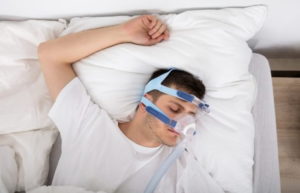The old joke “Uncle Joe snores so loud, he rattles the windows” may sound ridiculous, but snoring is no laughing matter. Snoring not only disturbs your bed partner’s slumber; it can cause serious harm to the snorer too. While medical intervention and lifestyle changes are usually prescribed to address this sleep disorder, something as simple as changing your sleeping position can mitigate the problem. In this guide, you will learn about the best sleeping position to stop snoring.
How your sleeping position affects sleep and snoring
Snoring is the noisy, harsh, and hoarse sound you make when you breathe while sleeping. It happens when the tissues in the upper airway, particularly the nasal passage and throat relax too much and collapse. This causes the narrowing or closing of the airway, making the air bounce around and vibrate and make a turbulent sound. Narrowing at the base of the tongue can also contribute to this harsh and noisy sound. Almost everyone snores from time to time, but for some, it can be a chronic problem and a symptom of an underlying serious health condition.
Snoring can also get worse when you have nasal congestion, such as allergies or colds. This is because breathing through your mouth allows the jaw and tongue to shift all the way back. Subsequently, drinking alcohol, which is a muscle relaxant, can affect the muscular tissue around the lining of the throat, which leads to snoring.
Sleeping on your back usually leads to snoring
If you regularly sleep on your back, then there’s a good chance you are predisposed to snoring. This is because sleeping on your back puts your airway in a position where it is likely to collapse, both from internal and external factors. In this position, your neck and your chest press down due to gravity, which leads to blockage in your airway.
Sleeping on your back can also cause a complete collapse of your airway, this is called sleep apnea. Sleep apnea happens when breathing is disrupted (repeatedly stops and starts). Loud snoring can be caused by Obstructive Sleep Apnea (OSA), it is potentially serious and leads to daytime tiredness. This happens when a person’s breathing is interrupted several times throughout the night.
It is characterized by louder snores, pauses between breaths (about 10 seconds), shallow breathing, and choking or gasping for air. People who suffer from OSA also experience morning headaches, frequent urination, and restless sleep.
Best sleeping position to stop snoring
Fetal position (curled up on your side)
Sleeping on your side is probably the easiest and most effective way to mitigate snoring, both time spent and intensity of snoring. This is why it is also the most popular choice, especially among women who are twice as likely to sleep on their side.
For the most part, it is a healthy position to sleep in as it allows the spine to rest in its natural alignment.
Sleeping in a lateral or side position is also said to ward off progressive neurologic disorders like Alzheimer’s and Parkinson’s disease. This is because the brain performs better removing waste that leads to neurological conditions while you are sleeping in this position.
This is also the preferred position of pregnant women. It doesn’t press the stomach and it improves circulation to the growing baby inside the womb, preventing the uterus from pressing against the liver.
Pro tip – You can improve this position by stretching out a little bit. Curling your body too much or pulling your body together in a tight ball can limit your diaphragm and lungs.
Log position (sleeping on your side, both arms down)
This is another healthy position to sleep that can help cut down snoring, especially snoring caused by sleep apnea. And since it sets the spine in a neutral position, it can help minimize back and neck pain.
Pro tip – When sleeping straight on your side, make sure you place a soft pillow or a blanket between your knees. This can reduce pressure on your hips.
Free fall position (sleeping on your stomach)
Sleeping on your stomach with your arms tucked under the pillow or either side of your head may seem comfy, but this is not the ideal position to doze off in. This can lead to back pain and neck problems. Also, it can place too much stress on your joints, and since you are sleeping on your stomach, it may perpetuate discomfort associated with acid reflux. Plus, there is a good chance you will toss and turn around to get more comfortable throughout the night.
This is not all bad though, as it can definitely relieve breathing difficulties caused by snoring, diminish sleep apnea, and may aid in digestion.
Pro tip – When sleeping on your stomach, make sure you avoid using stiff pillows. Pressing your face down on a stiff pillow can put your neck at an uncomfortable angle, which can lead to pain. Try using a softer pillow and sleep facing the mattress by placing the pillow under your forehead.
Soldier position (sleeping flat on your back)
Sleeping flat on your back with arms by your side may feel good at first, as it puts your head, neck, and spine in a neutral position. However, it is a proven way to worsen your snoring and sleep apnea symptoms. Gravity causes the tissues around the air passage and the tongue to collapse and block the airway. This leads to obstruction in the airway which causes loud snoring.
Moreover, sleeping in this position can lead to the thickening of the carotid artery, which supplies blood to the neck, face, and brain. Also, sleeping in this position can cause a sore lower back.
However, if you don’t suffer from chronic snoring and OSA, then you are all good to sleep in this position, especially if you regularly suffer from acid reflux.
Pro tip – To minimize snoring and avoid body aches, place pillows or rolled-up towels under your knees when you sleep in this position. This will help support the natural curve of your spine and reduce the chances of back pain. If you regularly snore or suffer from OSA, you should avoid this sleeping position. You are better off sleeping on your side.
Takeaway
As said earlier, you cannot go wrong with sleeping on your side. While it may seem uncomfortable and weird to force yourself to sleep strictly in one position, especially if you have been sleeping on your back your whole life, it is worth a try. A habit like this can change your life for the better.


























